
Sep 7, 2018 | Article
First and foremost and speaking for our our NHCTA / NH-CTE Board, we want to affirm our pride in–and admiration of–the NH-CTE community. It is an exciting time and certainly a moment to promote ourselves as a powerful and worthy option for high school students.
Key Theme
If there was one big picture theme for this academic school year, it would be: college and career readiness. For years as a culture, this concept has really been disproportionately focused on metrics aligned to “college readiness” rather than “career.” This model is not sustainable: not enough young adults are not making the gains they need to gain career employment; nor are enough businesses benefiting from a diverse and prepared workforce.
The state, and the country for that matter, has awoken–much to the credit of the CTE community (schools, post-secondary, industry, students, parents, friends.)–to realize that a more strategic and balanced approach to college and career readiness is needed. CTE is well positioned at this crossroads given our strategic initiatives over the past decade or more.
Your NHCTA / NH-CTE Board has been working hard to keep us “at the table” and promote our relevance (and agenda) to the state’s overall educational model. It is a worthy endeavor led by volunteers who consider themselves passionate stewards of NH-CTE.
Highlights
- The NH State School Board approved an alternative ALT IV route that does not require the Praxis, but is instead based on a candidate’s licensure and/or industry certification to demonstrate their “basic skills.” (special thanks to Bruce Farr and Barney Keenan)
- The NH Scholars State Board approved a fourth state designation called “Career Pathway,” which is almost ready for a pilot run this year. The criteria aligns beautifully to CTE priorities.
- The promotion of work-based learning (WBL) statewide through a partnership with the National Governors Association.
- The governor and legislature’s continued support of CTE center renovations: Salem and Dover opened this year, and Rochester, Alvirne, and Plymouth are in the works.
- Sustained efforts to partner with groups like the ELO network, The Alliance, NHCBE, and CCSNH to promote mutual interests to students and parents.
- The Bureau of Career Development support of upgrades to our competencies.
Our Board sponsoring statewide NH-CTE awards for excellence. We will celebrate key players, including teachers and industry partners to career counselors.
- The NH Senate continuing to support the SB190 CTE Focus Workgroup to create the most supportive environment, including through RSA’s, for CTE to flourish.
I offer a virtual shout out to the Commissioner of Education Frank Edelblut, Deputy Commissioner Christine Brennan and DOE division heads Heather Gage, Caitlin Davis and Michael Seidel. In addition, I also thank two staff members, Bill Ross and Amanda Noyes from credentialing, each of whom have been extremely professional in their collaboration with NH-CTE. This is a positive time for us and their genuine support for CTE has been remarkable.
Challenge
The one area in which we challenge our community is developing a comprehensive approach to cluster-based program development. This goes beyond professional development – it is team focused. We have had our fits and starts over the past few years and not enough gains have been made.
We are open to all ideas that help NH-CTE teachers create quality networks based on best practices to improve student performance. I credit the staff of the Bureau of Career Development and consultant Dr. Kathy McCabe for their collective efforts this summer at the 2nd annual NH-CTE conference. We still, however, have have a ways to go and the path is very tough to define.
Looking Ahead
Finally, our NHCTE / NH-CTE Executive Director Christine Carr has entered her 2nd year. She took a year to travel throughout and learn our community, and now she has come forth to author and implement a new focused vision for NH-CTE.
She is certainly challenging us. We will share details soon, but I would summarize that her proposal, which is supported by our board, is both bold and logical. This is a time for us to be ambitious.
I hope 2018/19 is your finest year. Please feel free to contact me or our board with any questions, concerns or (even) a willingness to be a part of our efforts. Also contact us at media@nhcta.org with any great story leads. The NH-CTE story needs to told regularly!
Steve Rothenberg, NHCTA/NH-CTE President
srothenberg@sau8.org
NHCTA / NH-CTE Board
President Steve Rothenberg, Concord
Vice President Chris Dodge, Salem
Treasurer Al Smith, Littleton
Secretary Jen Haskins, Pinkerton
Bruce Farr, Wolfeboro
Amanda Bastoni, Nashua
Bonnie Ackerman, Newport
Lisa Danley, Dover
Executive Director Christine Carr
Administrative Support: Debbi Cox
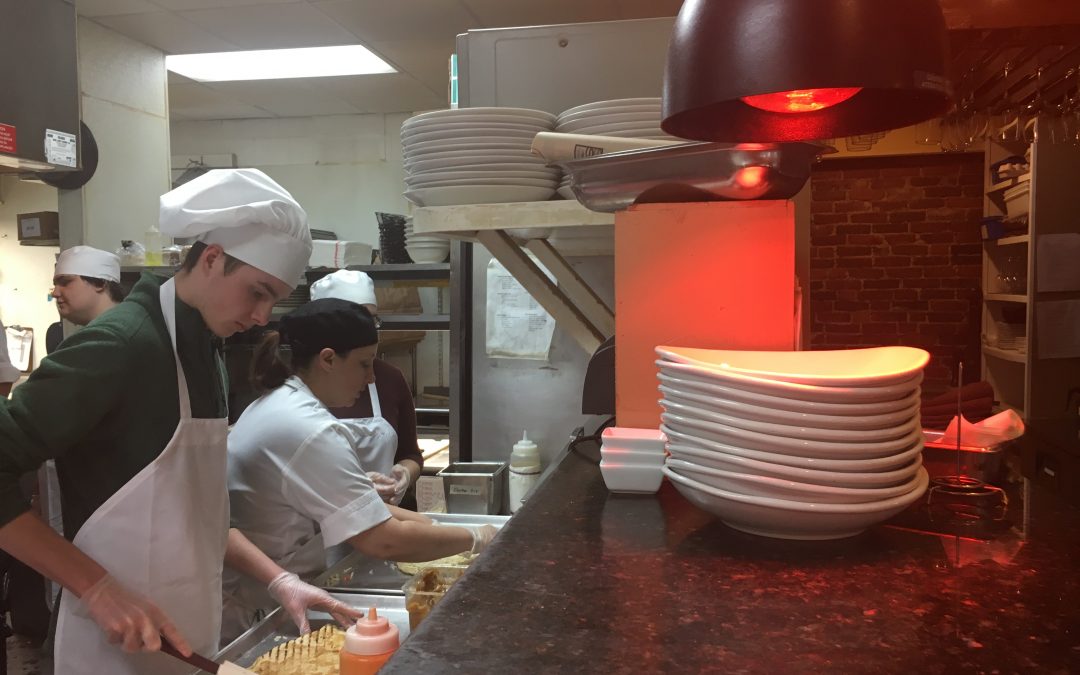
Aug 31, 2018 | Article, Uncategorized
In 2017, the New Hampshire Lodging and Restaurant Association (NHLRA) attended several sessions at the annual CTE Summer Conference to better understand the CTE model, which led to increased involvement at the same event this August.
We find our relationships with CTE centers integral to developing and strengthening the hospitality industry. In 2017, we attended several sessions as a way to further understand the CTE model, learn about successful messaging techniques, and network with teachers and administrators. In 2018,
“As Hospitality Sector Advisor for the Sector Partnership Initiative, we were invited to host a panel on ‘Connecting the Dots in Hospitality,’” said Amie Pariseau, NHLRA education and workforce development director.
The panel consisted of two members of industry, two educators, one career counselor, and one student.
“We also participated in a larger forum about the Sector Partnership Initiative and attended sessions,” she added.
In commenting on the theme of ‘Connecting the Dots in Hospitality,’ Pariseau said the NHLRA wants to connect industry leaders with students both in the classroom and in industry settings.
We want to introduce kids to what the restaurant, lodging, and tourism industry is all about,” she explained. “We’re providing them with a real sense of the broad range of opportunities available to them.”
She said some examples of how NHLRA is accomplishing these objectives include the following:
Inaugural New Hampshire Hospitality Month in April 2018
21 industry sites (hotels, restaurants, a ski mountain, a winery, Delta Dental Stadium) hosted 39 tours that introduced 320 students to various areas of the industry.
Girls Incorporated
NHLRA presented to 30 young ladies (grade 6-10) at a Young Women’s Leadership Camp about the nature of the hospitality industry, available careers, and importance of the industry to the state. Two women chefs joined the group for a food demonstration.
The Downtown Manchester Hotel also hosted an industry panel of women holding leadership roles at the property- general manager, controller, banquet manager, executive housekeeper, restaurant manager, front office manager, and director of sales.
“The attendees listened to what their job involved and their path to get where they are,” said Pariseau. “It was open to question and answer as well.
Five women from industry (executive chef, restaurant owner, training/ leadership director, director of events, on-site catering/ off-site catering manager and social media manager) also attended their wrap-up Career Fair.
“The campers had one-on-one time to ask questions and interact with the women,” she said.
Granite State College
“There is a need to support continuing education in the hospitality industry,” noted Pariseau, which she said explains why the NHLRA and Granite State College partnered to design a “workshop series” to fill that gap.
“This certificate program covers topics such as leadership, effective communications, and conflict management,” she said.
Across the three groups, 62 industry members focused on leadership, communication, and conflict resolution. Out of the 62 attendees, 48 completed all three sessions and received a certificate of participation endorsed by Granite State College and the NHLRA.
The next series, entitled Managing Human Resources in Hospitality, will take place this fall.
Why work with CTE Centers?
As far as Pariseau and the NHLRA itself is concerned, becoming more involved with CTE centers statewide in New Hampshire makes sense in a number of ways.
“The NHLRA is working to engage students about what hospitality is and what this great industry is all about,” she said. “It’s not just about being a chef or a front desk manager. Those are two well-known and needed careers, but it’s also about event managers, auditors, human resource managers, social media marketers, and more.”
She added, “Career pathways in hospitality reveal the ‘promote from within’ mindset and the increasing salaries that build with experience.”
The evolving partnership with CTE in NH also helps highlight the NHLRA, which Pariseau readily acknowledges is not well known by the general public
“We would like parents, non-NHLRA members, and other community resources to know that we can be a resource in regards to educational possibilities and industry connections such as job shadows, internships, and employment,” she said.
She said the NHLRA fully supports the efforts of the CTE centers.
“We will continue to share the network of engaged industry members to provide access to in-school and out-of-school opportunities to their students,” she said.
To learn more about the NHLRA, visit https://www.nhlra.com.
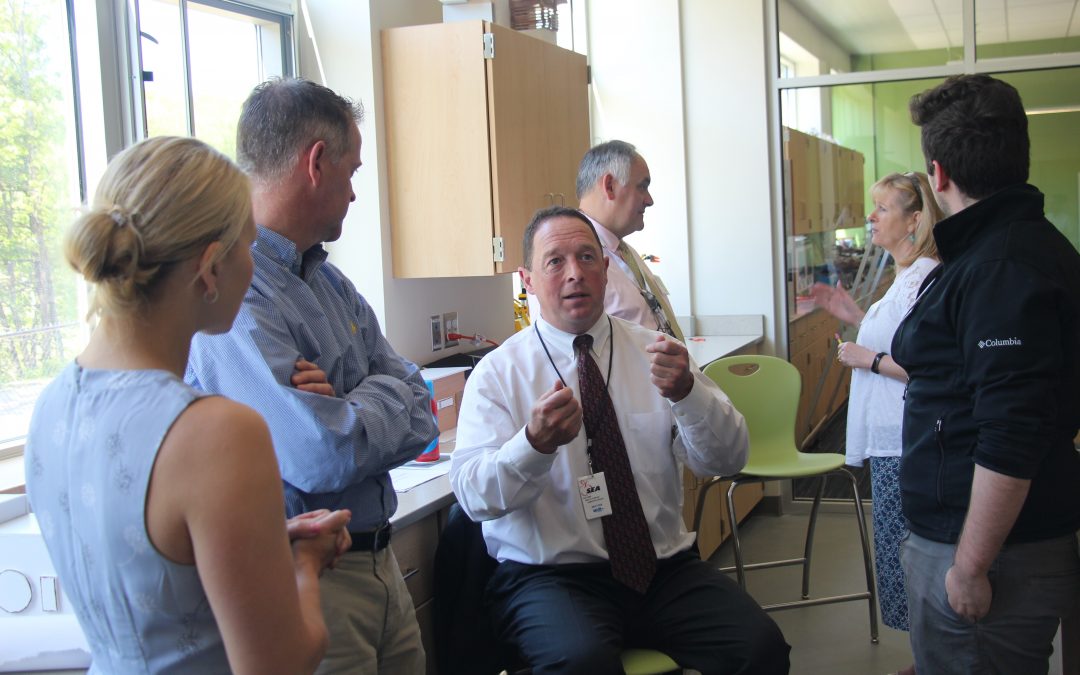
Aug 7, 2018 | Article
As part of the Creative Computing Challenge (CCC), a five-year program funded by the National Science Foundation, teachers at two Career & Technical Centers in NH this past year engaged students in creating their own apps. While on the surface, the class could be characterized as “computer science,” its purpose was to help teach computational thinking integrated into already on-going CTE class content.
“Computational thinking is essentially problem solving, but in the computer sense it’s essentially boiling everything down to yes or no,” said Curtis Killion, Computer Software & Media Applications Instructor at Salem HS Career & Technical Education Center.
Noting that computational thinking is really just “logical thinking,” Killion said that the applicability of the concept is quite broad.
“If you break things to simple questions like yes or no, you can logically build tools that can really handle complex tasks,” he said. “Working through this logic requires clear thinking and an ability to break down problems into very small parts in a step by step logical approach.”
“Getting students, or adults for that matter, into that “computational thinking” mindset requires a lot of patience. According to Killion, though, computational thinking is “really easy and simple” at its core.
Whereas Killion had students in his class create print and digital promotional collateral through the Adobe Creative Suite, students at the RW Creteau Regional Technology Center in Rochester worked in entirely different arenas.
Taught by Tracy Mitropoulos, one Accounting class provided students with the opportunity to create a fictitious business with the second focused on assessing child development milestones. She acknowledged, however, the second class was much more successful.
“They met with a preschool teacher and decided what they wanted to assess–it was more real for them,” she said. “There really was not a problem to solve in the accounting class, so the interest in it was not there.”
For Mitropolous, the resistance she met in the accounting class serves as fuel for the future.
“Unlike my Child Development students, my Accounting students did not have a ‘real purpose’ other than a grade for really caring about the app they were creating,” she said. “I need to find a way to make the Accounting App Project more meaningful.”
For Killion, his experience helped to open up his thinking about computer programming.
“My perception had always been that programming was about learning a language, but in reality it’s actually quite simple,” he noted. “As a teacher, I realized my perceptions about programming may have influenced my own students–and already this year, I had one young woman decide she was going to pursue a career in programming.”
Both teachers’ experiences within the classes helped to highlight an idea fundamental to CCC itself, which is that education is more effective when it frames the learning experience around what interests the students.
“A lot of questions were generated [in the class]–and although I often didn’t have the answers, it made me think of how relating content to what kids care about can really generate results,” said Killion. “The students really wanted to learn, and that attitude can make all difference in any subject area.”
Mitropoulos agreed and added, “Having a real purpose, or use for the completed apps, was motivational. As the Child Development students began assessing their preschool children, the sense of accomplishment they felt was palpable as they shared their experiences…As teachers, we have to be willing to embrace something new.”
This work is supported by grant #IIA-1348352 from the National Science Foundation.
This is the second of a multi-part series on CCC and the relevance of computational thinking in the classroom and industry in NH.
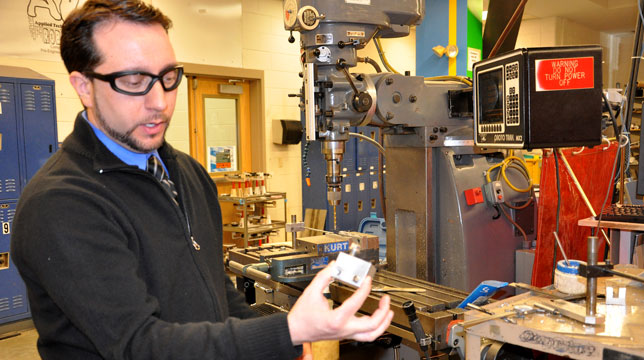
Jul 22, 2018 | Article
Not one to promote himself, Frank Xydias, high school engineering teacher at Milford High School, acknowledged surprise when he learned that a student–or several –nominated him for the iRobot -STEM -MVP teacher of the year award. He was even more surprised when he found out he won.
“I was happy, excited and honored at the thought of receiving such a prestigious award,” he said. “I then shared this news with family as it is a wonderful feeling to be acknowledged by a student…To have a student take the time to recommend me for an award such as the iRobot -STEM MVP award truly is amazing.”
The unexpected accolade, which culminates in receiving his award on September 12 at Fenway Park and being introduced on the field, serves as a source of reflection on why he chose a career in education.
“It is because you want to make a difference,” he said. “It is because you care about students and want to share your knowledge with others. It is heartwarming when a student goes into a career path because you inspired them.”
For Xydias, his chosen career field in STEM, which sometimes is referred to as STEAM with the ‘A’ standing for Arts, has never been more exciting.
He cited Milford’s Young Inventors program as one example. In this program, students create their own invention and present it in a professional setting.
Another program for which he expressed fondness is STEAM Nights, which provide opportunities for all Milford students to learn about career pathways offered in STEAM career paths.
As a result of these and other STEAM programs in the Milford School District, Xydias said they received personal invitations to participate and register for the Massachusetts STEM conference as a panel member for the Young Inventors organization.
“This will highlight some of the tools Milford uses to increase student participation and STEM awareness,” he explained.
They will also present at the Christa McAuliffe Technology Conference in October.
“One of the Christa McAuliffe board members attended our STEAM nights and consequently invited us to participate,” said Xydias. “We were asked to talk about our STEAM nights and invite our students and community members to join us on a panel.”
Xydias is also involved in the New Hampshire Joint Engineering Society, which is opening its doors to students at 13 school. Each school can bring 3 students and teachers to the conference.
“Students will be displaying projects as well as attending the open workshops to learn about current technology,” he said. “We have groups from FIRST, Young Inventors, PLTW, NHDOT TRAC, VEX robotics and STEM groups attending.”
In the summer, Xydias works with Manchester Community College and hosts a series of 5 STEM camps for middle school students. As part of the school’s summer learning series, he said they bring students off site to visit local engineering companies.
“Roughly a quarter of the students attending these camps attend my STEAM nights because they realize their learning and passion should not stop during the 180 days they are in school,” he said. “They learn to seek out opportunities for success.”
As for why Xydias stays so motivated about STEM or STEAM year round, he cited those “a-ha” moments experienced by students. One such moment occurred last year when he brought 50 female students to the Girls in Technology event at Manchester Community College.
“I was sitting in on a lab and watched the lightbulb of excitement and wonderment fill on each of the students’ faces,” he said. “This is the excitement that I see on the faces on my students in my class.”
He sees this excitement off-campus, too, especially when they visit local companies.
“Companies like Hitchiner is not just another company to that student,” he said. “It is a place they could work, a place where they have a connection, a place they can better understand.they have a connection to, and a better understanding of our community partners…Seeing that excitement in a student’s face is just one of the reasons why I love what I do.”
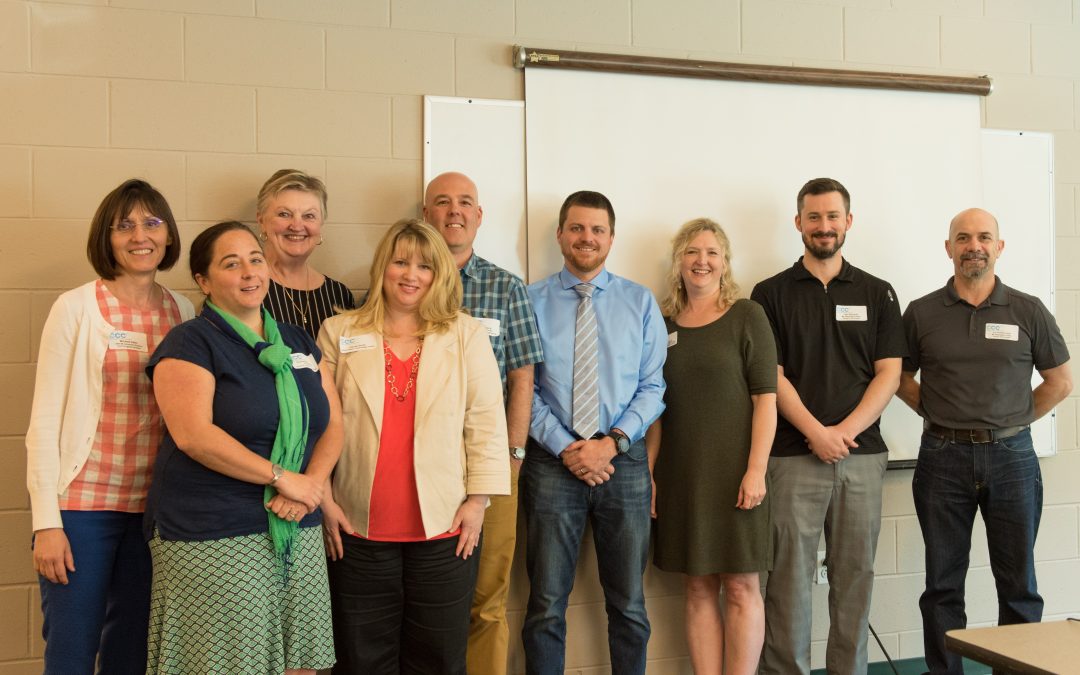
Jun 13, 2018 | Article
Loosely defined as the thought processes involved in formulating problems and expressing solutions in ways that can be carried out by computers, computational thinking is not just relevant for computer science.
This hypothesis has been the basis for Creative Computing Challenge (CCC), a five-year program funded by the National Science Foundation. Its purpose is to help prepare educators in New Hampshire CTE centers and high schools to teach a project-based and personally relevant computing curriculum to 400+ students.
Now in its fifth year, the program has been led by Mihaela Sabin, associate professor of computer science at UNH Manchester, who cited a broader purpose than is realized by even educators themselves.
“We are preparing teachers—whether in business, engineering, graphic design, or photography—to integrate computational thinking practices in their teaching,” she said. “We want to shift the emphasis from teaching students how to use technology tools to how to create and invent with technology.”
In these past 4 years, Sabin said they have refined the curriculum to focus less on learning about specific tools and more on framing the learning experience around what interests students. It is a shift that reflects broader changes in best teaching practices.
“We are shifting from a teacher centered learning environment to one that is student centered,” she said. “You have to ask your students who they are.”
In asking this question, Sabin said teachers put students at the center of the learning environment and give them a voice.
“This is equity-based teaching, so you have to trust the students and allow them to bring their own expertise into the classroom,” she said. “Learners don’t construct their own knowledge in a vacuum. Instead, they get engaged in personally meaningful activities and interact and share with peers to combine their learning experiences with what they already know.”
For today’s students, that means social media and programming platforms like Facebook or App Inventor, which served as the backdrop for CCC curriculum in which app-making was brought into the classroom at eleven New Hampshire schools. At Career and Technical Centers and high schools in Belmont, Concord, Conway, Derry, Dover, Keene, Manchester, Peterborough, Rochester, Salem, and Wolfeboro, students in classes from photography and business to cosmetology learned how to write apps. In addition to games, these apps included community projects, how to run an online store, assess developmental milestones in preschool children, and more.
“Teachers were impressed at how inventive and persistent the students were,” said Sabin.
Other CCC components have included a summer camp for girls, several intensive professional development summer institutes and school year workshops for teachers, and a Cooperative Extension STEM Docents Program for volunteers and K-12 educators to further sustain CCC curricula and learning activities.
One of the primary long-term objectives is to build teacher capacity long after funding for the program has been exhausted. Sabin also cited laying a strong bridge between education and industry.
“This is competency-based education where it is not just about knowing concepts and disciplinary content, but rather what students do with what they know,” she said. “When we focus on competencies, we bridge the disconnect between education, career readiness, and industry to make sure what is happening in the classroom is more connected to professional expectations.”
This work is supported by grant #IIA-1348352 from the National Science Foundation.
This is the first part of a multi-part series on CCC and the relevance of computational thinking in the classroom and industry in NH.

Jun 12, 2018 | Article
Should a business owner ever turn down work? If you own a business in what is broadly referred to as “the trades,” the answer is probably yes, which Al Lawrence, owner of Artisan Electric in Madbury, NH, says only tells part of the story.
The building industry is struggling because we have paid so little attention to the need for workers that we are all starting to really feel the pain,” he said. “We are turning down work because we cannot met the demand. We just don’t have qualified personnel to do it.”
According to Lawrence, though, there are no simple solutions to this problem, as he noted many secondary students today are still not aware of Career and Technical Education (CTE) in the state. CTE is defined as hands-on, real-world learning that applies directly to a job or career.
“It’s offered at high schools across the state, but there is still a misunderstanding about the jobs that result from this education,” he said. “These are jobs in the building industry, health care, finance, automotive and other industries—it’s more diverse than people realize.”
He said what people also do not realize is the rate of pay associated with jobs that open up fairly quickly for students who have availed themselves of CTE while in high school.
“A couple years ago, I might start someone out at $10/hour with a plan to get to $20/hr in 4 years, whereas now it is more likely they will reach $25 or $30/hour in that same time frame,” he explained. “These types of wages are comparing with a lot of so-called professional careers. These are lost opportunities for today’s students.”
Describing an “upward pressure” that is forcing business owners like him to rapidly increase wages to entice prospective job applicants, Lawrence said he is “really concerned” at what is described as “the graying of NH.”
“The average age of an electrician is over 50 in this state,” he said. “Do you think these people are all going to be pulling wires until they are 70? I don’t think so.”
The solution, according to Lawrence, is to not just promote more heavily the opportunities that currently exist in CTE, although he said that is a start.
“That’s why I’m involved with SkillsUSA New Hampshire,”said Lawrence, who also serves as treasurer. “I try to go out as much as I can to talk to kids about the opportunities in my industry and the business side of things…As an industry, we need to be out there.”
He said the solution, however, is much more complicated that putting together advertising campaigns. In short, he cited a gap in middle or soft skills.
“People think about the technical skills with my industry, and there is truth to their importance,” he said. “However, this is part of an old paradigm that is started to change. “Soft skills like communication, the ability to work on a team, and showing up on time—these are the skills we really need today and we have always needed.”
“To some extent, I can teach anyone how to wire a building,” added Lawrence, but I can’t teach you how to be a friendly person, treat people with respect or instill a desire to problem solve.”
According to Lawrence, though,one of the most important aspects of the current employment shortage is something people do not talk about enough in industry or at all.
“What does success look like,” he said. “What does a modern career look like? We need to change our paradigm of what that looks like. I need to change, too. We need to make sure we put first things first.”
This is the first in an ongoing series of articles with Lawrence and other business owners on the employment gap, the importance of CTE and other related issues.

May 31, 2018 | Arts, A/V Technology & Communication, Film/Video & Photographic Arts, Other, Programs, Radio & Television Broadcasting Technology, Tid Bits
Advance CTE’s annual Excellence in Action award recognizes and honors superior Career Technical Education (CTE) programs of study from across the nation. Selected programs of study will exemplify excellence in the implementation of the Career Clusters, show a true progression from secondary to postsecondary education, provide meaningful work-based learning opportunities, and have a substantial and evidence-based impact on student achievement and success.
Nashua Technology Center South is the 2018 nationwide winner for the Arts, A/V Technology & Communication Career Cluster. The program is the result of a school responding to the needs of its students. A survey revealed that students had a significant interest in the TV and Video Broadcasting Career Pathway. After a few years of planning with industry and education partners in the community, the Video Production & Broadcasting program was established in 2001. All students learn the basic foundation of media skills, from field to studio production. To support success in both career and college, learners earn a user certification in Avid Media Composer editing software and up to three college credits through the New Hampshire Community College system. Read More
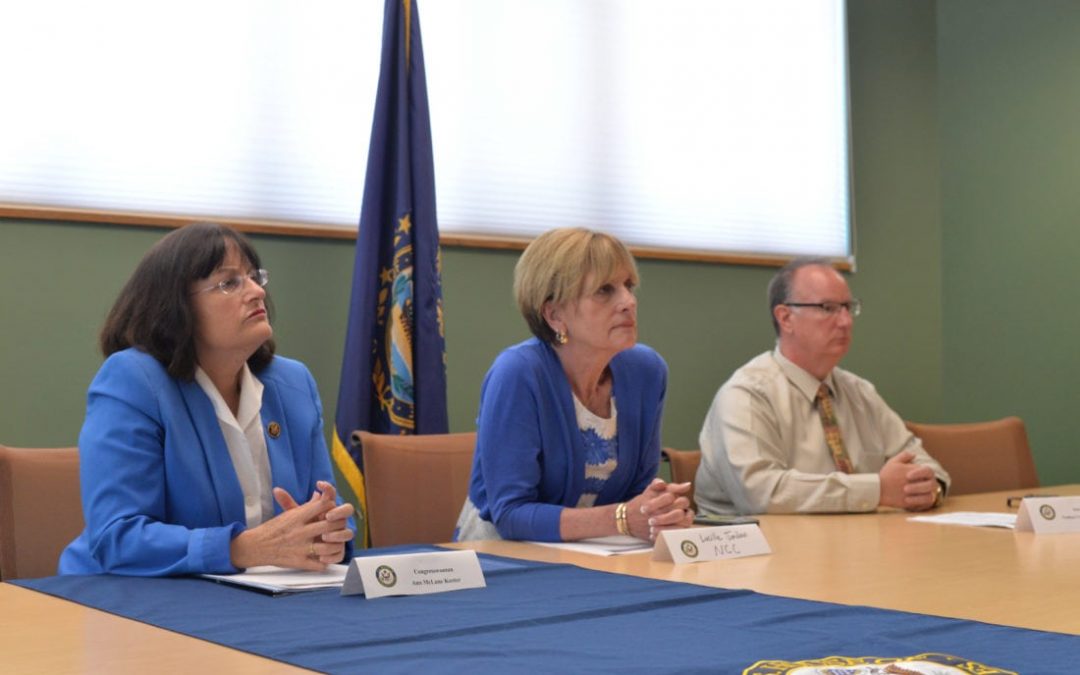
May 31, 2018 | Article, CTE Promotion
Representative Annie Kuster recently released a plan she terms the “Jobs and Opportunity Agenda.” Kuster highlighted the state’s relatively low jobless rate, saying the challenge now is to provide New Hampshire students the training they need to attain employment.
“We have the jobs and we’re looking for people with the skills to fill those jobs,” is how U.S. Rep. Annie Kuster, D-N.H., describes the Granite State’s economy.
Nashua CTE Director, Amanda Bastoni, was on hand commenting “CTE is not your parent’s vocational program: it’s not where we put the ‘other kids.’ It’s really a true college or career pathway. If we can partner with industry to bring speakers in to do on-the-job training, to do summer classes to give kids those experiences, the research says they’ll make choices that we’re looking for with career and college,” Bastoni said. Full Article
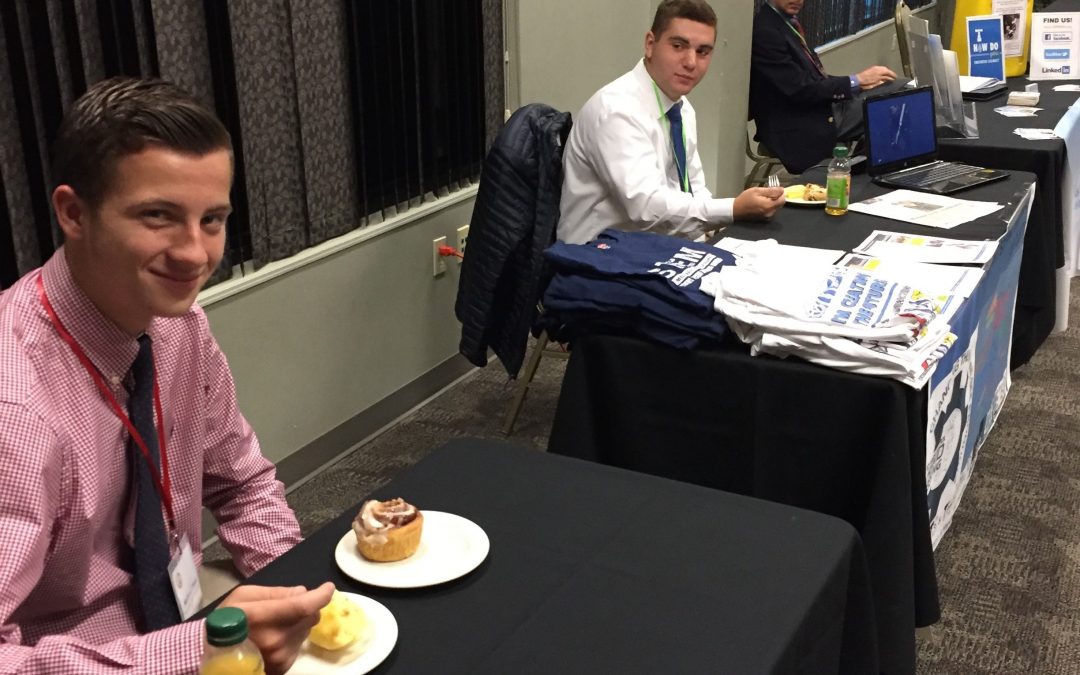
May 6, 2018 | Article
Reflecting its mission “to provide education, leadership, and support for the profession of Engineering across all disciplines of practice,” the New Hampshire Joint Engineering Societies (NHJES) is inviting students to its annual fall conference in October.
NHJES is made up of organizations such as; Structural Engineers of New Hampshire (SENH), Society of Women Engineers (SWE), American Council of Engineering Companies (ACEC), Institute of Electrical and Electronics Engineers (IEEE), and many more.
According to NHJES Board Member Frank Xydias, engineering instructor at Milford High School & Applied Technology Center in Milford, participation in the conference will provide students with a unique opportunity.
“It is not often that high school students have the opportunity to attend a professional workshop and present their concepts in a real-world application,” he said.
This year’s invitation follows a similar one for last year’s conference in which Milford students attended workshops and breakout sessions. In addition, students Matthew Chase and Nikolas Liamos brought their prosthetic bike project to showcase at the 2017 NHJES conference.
One change this year, however, is that the invitation is statewide and open to 12 different STEAM/STEAM groups. Xydias noted the grand vision for this year is to host 12 different groups that include 3 students and 1 teacher from the following groups: PLTW, VEX Robotics, US First Robotics, DOT TRAC, Young Inventors, or others. At this event, they will set up a table display with their projects.
“It is important for students to see the natural progression from interest to career and ways to support those careers through professional networks,” he said.
At the conference, high school students will also be able to learn about current technology and trends happening in industry.
“We ultimately hope these high school students will become members of NHJES or other professional organizations so they can give back in ways they received,” said Xydias. “We want them to see the value in collaboration and on-going training and education.”
He said there is also an immediate experiential learning component for students who attend the conference.
“Matthew and Nik arrived on-time at last year’s conference and ready to work,” he said. “In professional collars, shirt and tie, they greeted passers-by and talked about their project. It was the type of environment that challenged them to think about “why” and answer common questions about it, which is exactly what they will encounter in the engineering design process…It was a ‘text book’ idea board of sharing, but we were not in a classroom.”
These real world tests, noted Xydias provide students with valuable, potentially life-changing insight(s).
“Professional networking is a big part of this and other industries,” he said. “This conference can provide budding engineers with an inside glimpse into this world, a chance to talk to veteran engineers and learn from people in the industry today.”
To learn more about the conference, which takes place on October 9 in Concord and is supported by numerous sponsors who are donating space to students, visit https://docs.google.com/document/d/1ZljhkSLKJYNw-sPMYnqC2H5gzLYS2PzCvK_1KiecNQE/edit.
To sign up, click https://goo.gl/forms/aUIWi1S3HFldPzjk2.

May 4, 2018 | Article, Building & Construction Trades, Cabinetmaking & Millwork, Drafting & Design Technology, Electrician, Heating/Air Conditioning, Refrigeration, Heavy Equipment Maintenance & Repair, Plumbing & Water Supply Services, SkillsUSA NH, Tid Bits
This year’s Construction Career Days are scheduled for September 27th and 28th from 8:30-12:30. It will be held at the Hillsborough County Youth Center Foundation in New Boston, NH. New Hampshire Construction Career Days (NHCCD) exposes New Hampshire high school students to possible career paths in both the construction and transportation industries through a hands-on exhibits and educational resources. Labor unions, construction companies, school districts, state agencies, trade and professional organizations collaborate to provide the students with an introduction to various aspects of construction.
This event increases career awareness in the construction and transportation industries through hands-on experience with heavy equipment, welding, small tools, plumbing, electrical wiring, surveying, waste water management, bridge construction, land clearing, underground utilities, and other construction related jobs. Several secondary educational resources and career training pathways are available for students to learn about. Professionals from a wide array of construction related work are available to speak with students and answer questions about their experiences in the construction industry and why they are so passionate about their career.
The day is open to all high school students, both male and female, via registration through a participating school. In fact, one of the goals of this event is to Increase the attendance of women and minorities participating in this event to a target attendance of 25%. Last year we were able to reach out to just over 14% females and 21% minorities.
Information & Registration










